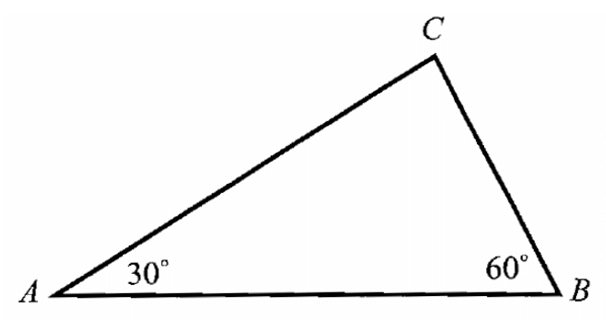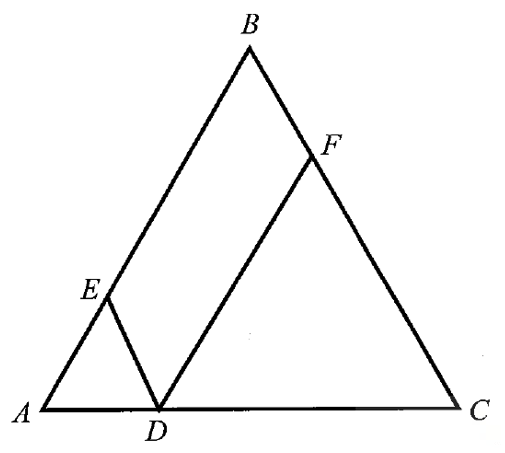SECTION FORMULA
Let A and B be two towns. Assume that one can reach town B from A by moving 60 km towards east and then 30 km towards north. A telephone company wants to raise a relay tower at P which divides the line joining A and B in the ratio 1 : 2 internally.
Now, it wants to find the position of P where the relay tower is to be set up. Choose the point A as the origin. Let P(x, y) be the point. Draw the perpendiculars from P and B to the x-axis, meeting it in C and D respectively. Also draw a perpendicular from P to BD, intersecting at E.
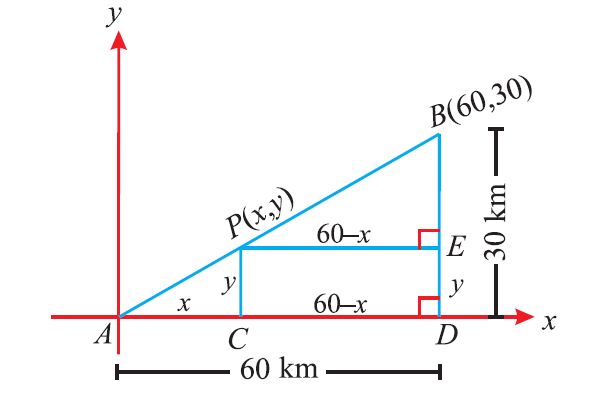
Since ΔPAC and ΔBPE are similar, we have
|
|
|
Therefore, the position of the relay tower is at P(20, 10).
Taking the above problem as a model, we shall derive the general section formula.
Let A(x1, y1) and B(x2, y2) be two distinct points such that a point P(x, y) divides AB internally in the ratio l : m.
That is,
AP/PB = l/m
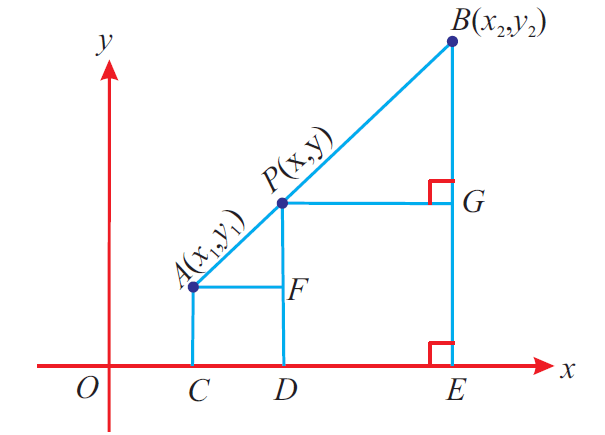
From the diagram above, we get
AF = CD = OD - DC = x - x1
PG = DE = OE - OD = x2 - x
Also,
PF = PD - FD = y - y1
BG = BE - GE = y2 - y
Now, ΔAFP and ΔPGB are similar.
Thus
|
|
|
Thus, the point P which divides the line segment joining the two points A(x1, y1) and B(x2, y2) internally in the ratio l : m is
This formula is known as section formula.
It is clear that the section formula can be used only when the related three points are collinear.
Results
Let AB be a line segment joining the two points A(x1, y1) and B(x2, y2) externally in the ratio l : m, then the point P is :
Solved Problems
Problem 1 :
Find the point which divides the line segment joining the points (3 , 5) and (8 , 10) internally in the ratio 2 : 3.
Solution :
Let A(3, 5) and B(8, 10) be the given points.
Let the point P(x, y) divide the line AB internally in the ratio 2 : 3.

By section formula,
Here (x1, y1) = (3, 5), (x2, y2) = (8, 10), l = 2 and m = 3.
Problem 2 :
In what ratio does the point P(-2, 3) divide the line segment joining the points A(-3, 5) and B(4, -9) internally?
Solution :
Given points are A(-3, 5) and B(4, -9).
Let P (-2, 3) divide AB internally in the ratio l : m.

By the section formula,
Here (x1, y1) = (-3, 5) and (x2, y2) = (4, -9).
Equating the x-coordinates, we get
Hence P divides AB internally in the ratio 1 : 6.
Problem 3 :
Find the points of trisection of the line segment joining
(4, -1) and (-2, -3)
Solution :
Let A(4, -1) and B(-2, -3) be the given points.
Let P(x, y) and Q(a, b) be the points of trisection of AB so that
AP = PQ = QB
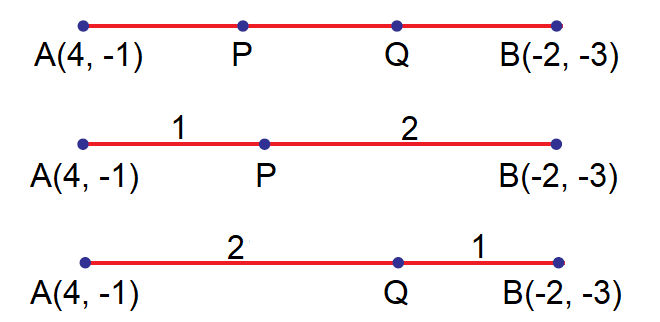
Hence P divides AB internally in the ratio 1 : 2 and Q divides AB internally in the ratio 2 : 1.
By the section formula, the required points are
Note that Q is the midpoint of PB and P is the midpoint of AQ.
Problem 4 :
Find the coordinates of the point which divides the line segment joining (3, 4) and (–6, 2) in the ratio 3 : 2 externally.
Solution :
Let A(3, 4) and B(-6, 2) be the given points.
Let the point P(x, y) divide the line AB externally in the ratio 3 : 2.

By section formula,
Here (x1, y1) = (3, 4), (x2, y2) = (-6, 2), l = 3 and m = 2.
Problem 5 :
Find the points which divide the line segment joining (-4, 0) and (0, 6) into four equal parts.
Solution :
Let A(-4, 0) and B(0, 6) be the given points.
Let P, Q and R be the three points which divide the line AB into four equal parts.

P divides the line segment in the ratio 1 : 3.
By section formula, point P :
Q divides the line segment in the ratio 2 : 2.
By section formula, point Q :
R divides the line segment in the ratio 3 : 1.
By section formula, point R :
Kindly mail your feedback to v4formath@gmail.com
We always appreciate your feedback.
©All rights reserved. onlinemath4all.com
Recent Articles
-
Derivative of Absolute Value of x Using Limit Definition
Apr 23, 25 11:11 AM
Derivative of Absolute Value of x Using Limit Definition -
Digital SAT Math Problems and Solutions (Part - 149)
Apr 23, 25 02:33 AM
Digital SAT Math Problems and Solutions (Part - 149) -
Digital SAT Math Problems and Solutions (Part - 148)
Apr 22, 25 08:20 AM
Digital SAT Math Problems and Solutions (Part - 148)
